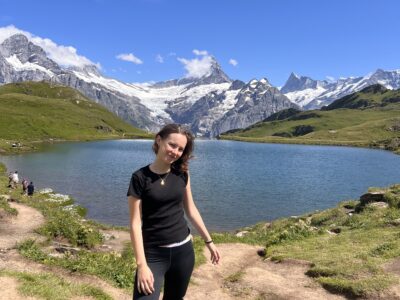By Nadine Fattaleh

This year, that challenge is to deliver early childhood education to 10 million slum dwellers in 5 years, using the seed capital awarded by the prize. New research indicates that early education–starting from birth to age six–is the critical and most unmet need of our current century. Pat Levitt, professor of neuroscience at the University of Southern California finds that “it is easier and less costly to form strong brain circuits during the early years than it is to intervene or fix them later”. The impact of dollars spent on educational interventions should then have a much higher impact on children below the age of six, even though immediate benefit may not be experienced. That is, overcoming the challenge of delayed gratification is of upmost importance here.
I am working James Rohbinson, Jeffery Koch, Maya Ezzeddine and Sebastian Hanna on team “Book Bag,” and we will be competing at the regional finals in Boston in March. Our idea aims to leverage distribution networks of food aid in India to improve early childhood education by printing engaging educational material on grain and wheat bags. By cooperating with corporate sponsors, our model hopes to utilize public-private partnerships in order to create a revenue stream that will help sustain our project, and to increase its scale beyond the 10 million slum dwellers initially targeted in the first 5 years of the plan. For the past few months, we’ve been preparing our presentation for the competition, reaching out to organizations, corporations and individuals that can potentially help us, and refining our business model so that it’s most competitive.
My experience working on the Hult Prize competition has supplemented my coursework in the undergraduate sustainable development program. In class, I have learned that sustainable development needs to be acknowledged and adopted on a dramatically wider scale to ensure the welfare of the environment and of future generations. The question is no longer why, but how a shift from the “business-as-usual” paradigm of profit maximization within the current modes of production to a sustainable combination of financial profitability, environmental responsibility, and social dignity will occur. Governments, international organizations like the United Nations, charities, and non-profit organizations have yet to demonstrate the capacity or scale to address the world’s challenges; the for-profit, private sector must be an essential actor in sustainable development, in order to bridge that gap.
It will take innovation and creativity to develop these hybrid, alternative models that can combine traditional business practices, with concepts of sustainable development. Such is the role of social entrepreneurship and competitions like the Hult Prize. Working on the Hult Prize has taught me that begging governments to acknowledge the importance of early childhood education, or urging the United Nations to incorporate the topic in the post-2015 agenda is both an insufficient (and perhaps naive) modus operandi to achieve real change. Rather, social entrepreneurship is needed to find creative and innovative start-up solutions that are profitable, can reach a scale proportional to the problem, and put social value creation at the heart of their agenda.
In theory, innovation and entrepreneurship can be taught in a traditional classroom setting, but the most creative ideas that drive us towards sustainable development are likely to come out of a competitive setting. My experience with team “Book Bag” in the past months has shown me that is precisely when working with groups of motivated, talented and driven individuals on real challenges that affect billions of people that you can come to view problems as possibilities, obstacles as opportunities, and food bags as sources of education.
Nadine Fattaleh is a sophomore in Columbia College studying economics and sustainable development. Originally from Amman, Jordan, she is interested in social enterpreneurship for solving economic and social issues in the Middle East.



